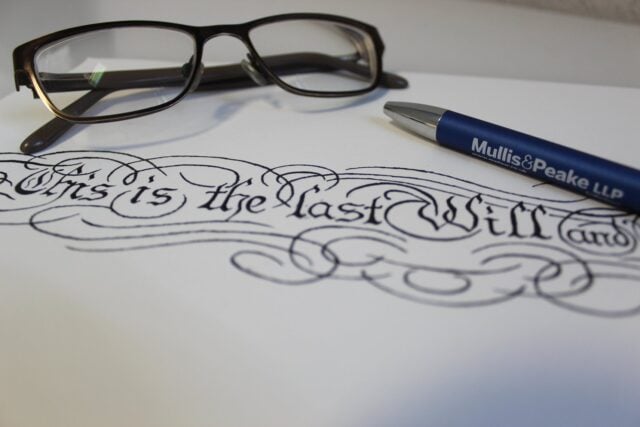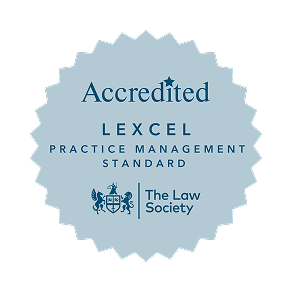We’re here to help. Simply leave your details and one of our friendly team members will give you a call at a time that suits you. You’ll be speaking directly with someone who’s ready to listen and guide you. Mullis & Peake will use the information you provide in this form in accordance with our privacy policy.
What Makes a Will Invalid?
If you believe a Will was not properly made, signed, or approved, or that the person who made it lacked capacity or was under pressure, our solicitors can help you understand your position and the options available.

Is there reason to question the validity of a Will?
Concerns about an invalid Will often surface unexpectedly, sometimes only after probate has been granted. Whether the issue relates to how the Will was signed, the testator’s capacity, or possible undue influence, early advice can help you understand your position and avoid unnecessary escalation. We take time to explain the law in plain English and guide you through your options with care.
You may be concerned that the person who made the Will did not fully understand the size of their estate or the effect of the decisions they were making.
A Will can be questioned where the testator was not aware of, or did not properly consider, those who might reasonably expect to benefit from the estate.
In some cases, concerns arise that the testator did not understand or approve the contents of the Will they signed.
You may believe the Will was made under pressure from a third party, rather than as a result of the testator’s free and independent decision.
Where there are serious concerns that a Will has been forged or altered, or that fraud was involved in its creation, urgent legal advice is essential.
Invalid Wills services
We provide tailored advice depending on the nature of the concern and the stage the estate has reached.
We review the Will, surrounding circumstances and relevant evidence to advise whether it is likely to be considered invalid and what grounds may apply.
Where mental capacity is in question, we assist with gathering and analysing medical records and other evidence to support or defend a claim.
We advise on the legal threshold for undue influence and help assess whether the evidence supports a challenge or a negotiated resolution.
Where probate has already been granted, we advise on setting it aside, potential time limits, and the practical steps involved.
Many disputes can be resolved without court proceedings. We aim to protect your position while exploring sensible settlement options.
What Makes a Will Invalid?
A Will can be challenged on several grounds, including failure to follow the formalities required under the Wills Act 1837. DIY Wills in particular can create risks where signing and witnessing requirements are not properly followed.
For a Will to be valid, it must meet strict legal requirements: the person making the Will and two independent witnesses must all be present in the same room during signing..
If these legal formalities are not met, the Will’s validity can be questioned, potentially rendering it invalid.
Key Factors That Can Make a Will Invalid
There are several key factors that can make a Will invalid:
- The Will was forged or fraudulent
- The Testator did not have the mental capacity to understand the extent of their estate and the implications of their decisions.
- The Testator was not aware of those who might reasonably expect to benefit from the estate – even if they choose not to include them.
- The person did not know or approve the contents of the Will
- The Will was made as a result of undue pressure from a third party
If a Will is found to be invalid, then the estate would be distributed according to the previous valid Will. If there wasn’t a previous Will, then the estate would be distributed as if the deceased had never made a Will (intestacy).
The witness of a Will must be an independent adult who isn’t related to the person making the Will (the testator) and has no personal interest in the Will. You can not be a witness if you are the spouse or civil partner of the testator. A neighbour or family friend is usually best.
Why choose Mullis & Peake
Contesting the validity of a Will is rarely straightforward. It often involves family relationships, strong emotions, and complex legal questions. Our role is to bring clarity, proportion and reassurance at every stage.
Our solicitors regularly advise on Will validity disputes and understand how courts approach issues such as capacity, execution and undue influence.
We explain the law and your options clearly, without unnecessary legal jargon, so you can make informed decisions at a difficult time.
We focus on resolving disputes efficiently, considering cost, evidence and family dynamics before recommending formal action.
We have long-standing relationships with families across Essex and are known for our measured, professional approach to contentious probate matters.
Frequently asked questions
Questions about whether a Will is legally valid often arise where there are concerns about capacity, pressure from others, or how the Will was prepared and signed. Our experienced contentious probate solicitors provide clear, practical guidance on when a Will may be challenged, what evidence is required, and how disputes can be handled sensitively and proportionately during a difficult time.
A Will may be invalid if it was not executed correctly, if the person making it lacked mental capacity, if it was made under undue influence, or if it does not meet the legal requirements set out in the Wills Act 1837. Each case depends on its facts.
Yes, in some circumstances. While it is usually easier to raise concerns before probate is granted, challenges may still be possible afterwards. Time limits and procedural steps can apply, so early advice is important.
Evidence is crucial. This may include medical records, witness statements, solicitor attendance notes, or documents showing how the Will was prepared. We help identify what evidence may be needed.
There is no single time limit for all invalid Will claims, but delay can weaken your position. Acting promptly helps preserve evidence and options.
Yes. Many Will validity disputes are resolved through negotiation or mediation. We always consider proportionate alternatives before recommending litigation.
Costs depend on the complexity of the case and how it is resolved. We are transparent about fees and discuss funding options at an early stage.
Get in touch with our Wills and Probate Team
If you are facing a dispute over burial, ashes, or funeral arrangements, we are here to help you understand where you stand and what steps may be available.
"*" indicates required fields






